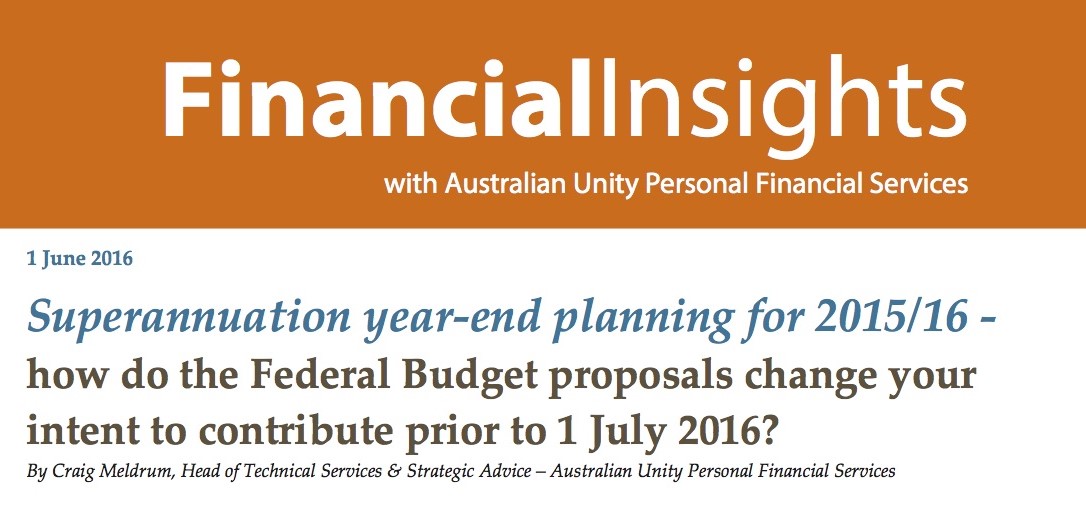Understanding what you could do before and after 30 June 2016 can provide the icing on the tax cake for employees, investors and those in small business. Such things as bringing forward tax deductions or delaying the reœipt of income within the rules can mean less tax this year.
When it comes to superannuation, make sure you maximise the tax deduction this year or salary sacrifice the right amount so you get the best possible outcome and don’t end up with tax penalties.
That may not be as easy to determine this year, because the recent Federal Budget proposed a number of changes to super contribution rules. This has caused quite a bit of confusion for tax payers.
How will the proposals impact on your superannuation plans this year? Most of the proposals only apply from 1 July 2017 and as a result will not affect your plans this financial year (plus they have to be passed by parliament before they become law). There is one proposal however set to start from 3 May 2016 which may impact your 2015/16 contribution plans which we’ll explore below.
To help you ensure you abide by all relevant laws, here’s a review of the rules that apply up to 30 June 2016:
Maximum employer and self-employed deductible contributions (Concessional Contributions)
For people aged 49 or over as at 30 June 2015 (and who are eligible to make tax deductible contributions to superannuation or receive employer superannuation support including salary sacrifice), the maximum amount that can be contributed is $35,000 (including Superannuation Guarantee contributions). For everyone else, the limit is $30,000.
The Federal Budget signaled a reduction in the maximum level of concessional contributions for everybody to $25,000 from 1 July 2017. Whether or not this measure is legislated, it will not affect your contributions for this year.
If this change is legislated (which will be dependent on the Coalition winning government and the measure passing the Senate), it will be inherent upon superannuation members to speak with their advisers about their contribution and transition to retirement strategies to ensure they do not contribute above the legislated caps.
Two beneficial changes that have been proposed related to tax deductions and to age eligibility to contribute. Currently, if you are an employee and receive superannuation guarantee support from your employer, you can’t generally also daim a tax deduction for any personal contributions to super.
This is set to change from 1 July 2017 to allow more people utilize their full concessional contribution cap.
To add this measure, if you are older than 65 you currently need to meet a work test to contribute to super this year. You will need to work for at least 40 hours during 30 consecutive days prior to making any personal contributions in the financial year. The second budget proposal mentioned, which is also set to start from 1 July 2017, seeks to remove the work test for all superannuation members up to age 75.
Making after tax contributions to super (Non-Concessional Contributions)
You can make after-tax contributions to super which could come from your personal savings, transferring personal investments, an inheritance or from the sale of investments.
The current legislated maximum you can invest in super as a personal after-tax contribution is currently $180,000 p.a. 1f you are under age 65, you have also been able to ‘bring forward’ up to two years of non-conoessional contributions. This means you could contribute $540,000 in one financial year, but you would not be allowed to make non concessional contributions in the following two financial years.
The way it works is that if you are under 65 and make total after tax contributions of more than $180,000 in a financial year the bring forward rule is triggered.
However, a proposal from the 2016 Federal Budget seeks to replace the current non-concessional caps mentioned above with a $500,000 lifetime limit with a start-date of 3 May 2016 that would include previous non-conoessional contributions made back to 1 July 2007. As mentioned above, these measures would only be effective if the Coalition is elected and the measures are passed by the Senate.
The proposal suggests that if an individual has exceeded the cap prior to the commencement date of 3 May 2016, they will be deemed to have used up their cap, but will not be required to take the excess out of the superannuation system.
However, if you are considering making a large non concessional contribution, either this financial year or in subsequent years, to ensure you do not inadvertently exceed your contributions limit, speak to your adviser about your superannuation contribution options including deferring your decision at least until you know who wins government on 2 July 2016.
Beware of excess contributions tax
It is inherent on all superannuation members to be aware of their contributions history and understand the level of both concessional and non-confessional contributions they have made to all their respective superannuation funds, including non-accumulation superannuation life policies. To date, knowledge of your after-tax personal contribution history for at least the last three years was critical to avoid exceeding the bring forward non-concessional cap.
However, if the recent budget measure to impose a lifetime cap of $500,000 is legislated, superannuation members will need to know how much they have contributed right back to 1 July 2007. Anyone making large superannuation contributions should exercise extreme care for any type of contributions to avoid excess contributions penalties, which, while able to be managed, can be costly and time consuming to correct and involve further tax and interest penalties.
Government co-contribution
If your total income is less than $50,454 you may like to take advantage of the Government co-contribution. You can do this by making after tax (non-concessional) super contributions before the end of the financial year. For every dollar of contributions that is eligible, the Government contributes 50 cents to your superannuation up to a maximum government co-contribution of $500.
For 20 15/16, the maximum government co-contribution is payable for individuals on incomes at or below $35,454 and reduces by 3.33 cents for each dollar above this, cutting out completely once an individual’s total income for the year exceeds $50,454.
Who is Australian Unity Personal Financial Services?
Australian Unity Personal Financial Services specialises in helping accountants help their clients create more secure financial futures through the provision of professional financial advice, finance broking, and insurance services. We have a flexible service offering and give you the choice of providing financial services in-house under our licence and/or referring your clients to our financial specialists.
We can help you provide your clients with a detailed and totally tailored blueprint for financial success — whether you provide the advice in-house or refer your clients to our specialists — in any or all of the following areas:
- Financial advice
- Home loans
- Personal estate planning
- Wealth creation
- Commercial loans
- Business estate planning
- Retirement planning
- Investment loans
- Personal risk insurance
- Investments
- Equipment finance
- Business risk insurance
- Superannuation
- Car finance
Australian Unity has a proud 175 year heritage of helping Australians create secure financial futures. This pedigree and experience, combined with our corporate strength and leading edge strategic advice capability, means we are uniquely placed to offer you high quality personal financial services… each finely tuned to your particular needs to ensure you achieve your vision of a secure financial future.
After all, your financial wellbeing is at the heart of everything we do.
Disclaimer: The information provided is current as at 1 June 2016 and is subject to change. You should contact your tax adviser for further information. This article is not legal advice and should not be relied on as such. Any advice in this document is general advice only and does not take into account the objectives, financial situation or needs of any particular person. You should obtain financial advice relevant to your circumstances before making investment decisions. Where a particular financial product is mentioned you should consider the Product Disclosure Statement before making any decisions in relation to the product. Whilst every care has been taken in the preparation of this information, Australian Unity Personal Financial Services Ltd (‘AUPFS’) does not guarantee the accuracy or completeness of it. Where an artide is provided by a third party any views in that article are the views of the author and not of ALJPFS. AL[PFS does not guarantee any particular outcome or future performance. AUPFS is a registered tax (financial) adviser. Any tax advice contained in this document is incidental to the financial advice in it. You should seek specialist advice from a tax professional to confirm the impact of this advice on your overall tax position. Australian Unity Personal Financial Services Ltd ABN 26098 725 145, AFSL & Australian Credit Licence No. 234459, 114 Albert Road, South Melbourne, VIC 3205. This document produced in June 2016. © Copyright 2016

